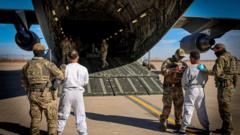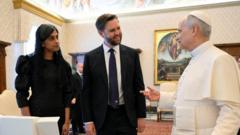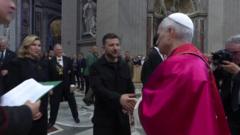The surprising election of the first American pope, Leo XIV, has stirred initial skepticism among Roman Catholics globally; however, his multicultural identity and emphasis on global unity have begun to quell apprehension.
American Pope Leo XIV Bridges Cultures, Calms Concerns Among Global Catholics

American Pope Leo XIV Bridges Cultures, Calms Concerns Among Global Catholics
With his multicultural identity and diplomatic messages, Pope Leo XIV reassures Catholics worldwide amidst skepticism surrounding an American pontiff.
The unexpected elevation of Cardinal Robert Francis Prevost to Pope Leo XIV marked a transformative moment for the Catholic Church, as the first American pontiff ushered in a wave of intrigue and skepticism. On the iconic balcony of St. Peter’s Basilica, he chose to address the faithful in Spanish, emphasizing his connection to a diverse global community rather than focusing solely on his American roots.
Born in Chicago to a Creole family and having served as a bishop in Peru for many years, Pope Leo XIV’s multilingual prowess—speaking at least three languages—paints him as a cosmopolitan leader. As soon as he delivered his opening remarks, his intent was evident: to assert himself as a global citizen rather than a conventional American figure. This pivot has resonated with Catholics across the globe, who found solace in his multicultural acknowledgment.
“We see him as ours,” said Julia Caillet, a 33-year-old doctor in Paris, during a gathering for young Catholic devotees celebrating their new leader. “He embodies not just an American identity but a Peruvian and worldwide identity as well—a true priest of the world.”
During a time of political isolationism under President Trump, there was considerable anxiety regarding an American pope potentially aligning the Church too closely with U.S. government policies. Thus far, however, Leo XIV has allayed such fears by adopting a stance reminiscent of Pope Francis, championing peace, justice, and advocacy for marginalized communities worldwide, particularly migrants and those affected by war.
His ability to project a moral vision transcending national boundaries offers a counter-narrative to potential isolationist impulses and fosters unity within the Catholic community globally. By presenting himself as a representative of diverse traditions and voices, Pope Leo XIV is gradually transforming perceptions of an American pope into one of a global moral leader.
Born in Chicago to a Creole family and having served as a bishop in Peru for many years, Pope Leo XIV’s multilingual prowess—speaking at least three languages—paints him as a cosmopolitan leader. As soon as he delivered his opening remarks, his intent was evident: to assert himself as a global citizen rather than a conventional American figure. This pivot has resonated with Catholics across the globe, who found solace in his multicultural acknowledgment.
“We see him as ours,” said Julia Caillet, a 33-year-old doctor in Paris, during a gathering for young Catholic devotees celebrating their new leader. “He embodies not just an American identity but a Peruvian and worldwide identity as well—a true priest of the world.”
During a time of political isolationism under President Trump, there was considerable anxiety regarding an American pope potentially aligning the Church too closely with U.S. government policies. Thus far, however, Leo XIV has allayed such fears by adopting a stance reminiscent of Pope Francis, championing peace, justice, and advocacy for marginalized communities worldwide, particularly migrants and those affected by war.
His ability to project a moral vision transcending national boundaries offers a counter-narrative to potential isolationist impulses and fosters unity within the Catholic community globally. By presenting himself as a representative of diverse traditions and voices, Pope Leo XIV is gradually transforming perceptions of an American pope into one of a global moral leader.




















